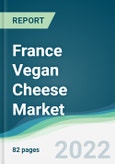The market drivers that are fundamental to an anticipated upswing in the French vegan consumption trend are inclusive of but not limited to the growing population. The increased health consciousness of consumers is reportedly fuelling health and wellness products along with functional food products.
Additionally, being the second largest organic market in Europe, fair trade and organic products are becoming increasingly popular among French consumers. Also, French consumers consider ethnic foods, health food as well as free-from products, i.e., products that are devoid of lactose or gluten and locally grown products, more attractive. Concerns about animal welfare and the environment, along with the considerations, are steering an increasing share of consumers in France toward a vegan diet [Source: USDA].
Further, the food bill of France that was definitively adopted by Parliament in October 2018 also underscores the importance of healthy, safe, and sustainable food for all, which mandates the public sector mass catering to use 50% of products derived locally and quality certified from January 2022, among others [Source: French Government]. The aforementioned is poised to impact the manner in which cheese has been traditionally consumed and facilitate the expansion of the scope for reinvention, which otherwise had been restricted due to the high level of maturity that has been characteristic of the French cheese market.
Besides the impacts of COVID-19, which brought the country into recession, retail food was considered an essential industry by the government that enabled most firms to operate, suggesting plausible sustenance of the French vegan cheese market. The pandemic has further augmented the proclivities to include vegan food in the daily diet since it is associated with healthy, wholesome, and natural products. Thus, the upswing of veganism has led to certain recent market developments, like the launch of vegan Camembert by a cheese producer from the Lorraine region called Les Petits Veganne, reported in February 2018, which is further expected to drive the France cheese market growth. The product is reportedly made from cashew nut milk.
Further, in March 2020, the cheese group Bel, owner of the Kiri, the Laughing Cow, and Babybel brands, has announced the finalization of the acquisition of 80% of All In Foods’ share capital of the Pays de la Loire start-up, which markets the Nature &Moi brand and specializes in products made from plant proteins which are inclusive of plant-based cheeses. Later in November 2018, it was reported that Domino's France was to add two vegan cheese pizzas to its menu which are namely Vegan Margherita and Spicy Vegan, to be made available across the nation. Further, the international pizza chain also reportedly offered the facility to their customers to make their vegan pizza from the chain's list of plant-based ingredients.
Key Developments
According to a press release by vegconomist in May 2021, The Violife brand has introduced itself into the French market and its products are currently available in supermarkets and outlets across France. The company has initially deployed ten references, separated into four product categories: grated cheeses, sliced cheeses, creamy spreads, and cheese blocks.
As reported by Jay & Joy, an exclusive french vegan cheese company; Jean-Jacques, the plant-based alternative to Maroilles cheese, won the Sirha Green Award 2022 in the Food/Drinks category. The product is made from almond milk and cashew nuts and is gluten and soybean free.
Impact of the COVID-19 pandemic
The outbreak of the virus led to a major decline in the revenue and economy of the region. Strict government regulations led to a significant slowdown in major industry sectors. The COVID-19 pandemic had a severe effect on the France vegan cheese market, due to the disruptions in supply and production lines. The region was faced with a scarcity of vegan cheese products, despite the steady demand. However, owing to the swift government actions taken to ensure a sufficient supply of food in the region, the industry rebounded quickly enough. Moreover, increasing allergies and intolerances among people are expected to fuel market growth.
Segmentation
By Source
- Soy Milk
- Almond Milk
- Coconut Milk
By Product Type
- Mozzarella
- Parmesan
- Cheddar
By Distribution Channel
- Online
- Offline
- Hypermarkets
Table of Contents
Companies Mentioned
- Jay&Joy
- Les Nouveaux Affineurs
- Petit Veganne
- The Bel Group
- Tomm’Pousse








